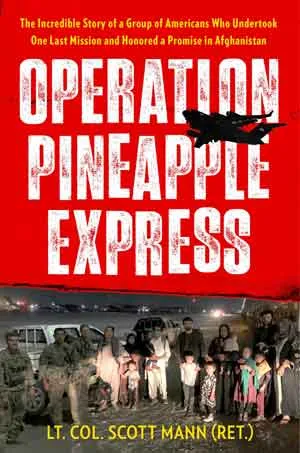Operation Pineapple Express: Coping with the Blitzkrieg Withdrawal from Afghanistan
President Biden put in motion the blitzkrieg withdrawal from Afghanistan.
This is what I wrote last month on the occasion of the release of a House Foreign Affairs Committee committee on that event and its consequences:
The Afghan debacle is a major setback for any notion of U.S. leadership of the world of liberal democracies.
Even though the Biden-Harris Administration frequently touts their allied-friendly strategy in foreign policy, the “blitzkrieg withdrawal” from Afghanistan is more than a road bump.
It is a strategic moment of great significance in U.S. global leadership.
The Obama Administration focused its attention on the “good war” versus any focus on “great power competition.”
The rise of the multi-polar authoritarian world was certainly aided by this lack of focus and accelerated by the “blitzkrieg withdrawal.”
But there has been a clear effort by some U.S. veterans to do what the U.S. government should be doing, namely trying to help those Afghans and Americans left behind as a result of the blitzkrieg withdrawal.
Recently, a book has been published written by one of those veterans about the effort to do the right thing and not forgetting the meaning of honor.
The book is described this way on Amazon:
In April 2021, an urgent call was placed from a Special Forces operator serving overseas. The message was clear: Get Nezam out of Afghanistan now. Nezam was part of the Afghan National Army’s first group of American-trained commandos; he passed through Fort Bragg’s legendary Q course and served alongside the US Special Forces for over a decade. But Afghanistan’s government and army were on the edge of collapse, and Nezam was receiving threatening texts from the Taliban. The message reached Nezam’s former commanding officer, retired Lt. Col. Scott Mann, who couldn’t face the idea of losing another soldier in the long War on Terror. Immediately, he sends out an SOS to a group of Afghan vets (Navy SEALs, Green Berets, CIA officers, USAID advisors). They all answer the call for one last mission.
Operating out of basements and garages, Task Force Pineapple organizes an escape route for Nezam and gets him into hiding in Taliban-controlled Kabul. After many tense days, he braves the enemy checkpoints and the crowds of thousands blocking the airport gates. He finally makes it through the wire and into the American-held airport thanks to the frantic efforts of the Pineapple express, a relentless Congressional aide, and a US embassy official. Nezam is safe, but calls are coming in from all directions requesting help for other Afghan soldiers, interpreters, and at-risk women and children. Task Force Pineapple widens its scope—and ends up rescuing 500 more Afghans from Kabul in the three chaotic days before the ISIS-K suicide bombing. Operation Pineapple Express is a thrilling, suspenseful tale of service and loyalty amidst the chaos of the US withdrawal from Afghanistan.
In an interview in 2022 with the author of the book, Martin Kuz discussed the operation and its mission.
You write that U.S. veterans, beyond a sense of obligation to Afghan soldiers, acted out of despair over what they saw as America abandoning its principles.
Here’s the thing: These veterans know something that the politicians, the diplomats, and the careerist senior military officers don’t know. It is that there is a requirement in our line of work that “I have your back” means something. They know that our failure to honor that promise is way bigger than the moral issue.
One of the veterans in our group said, “Not only did the evacuation wind up on our shoulders, but we find ourselves trying to restore the honor of the United States.” My goodness. What kind of massive task is that? The redistribution of responsibility from our institutional leaders onto the shoulders of our veterans is disgusting.
The book provides details on how these veterans are doing this operation and at what cost and risk to themselves. This is an effort which reminds that “no man left behind” also refers to the honor and credibility of the United States.

